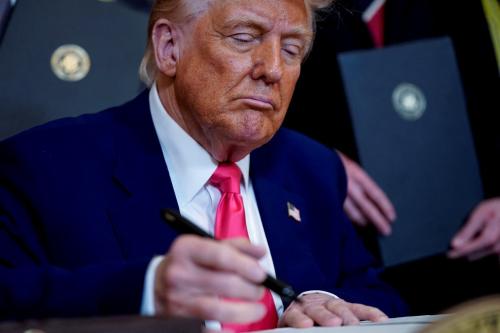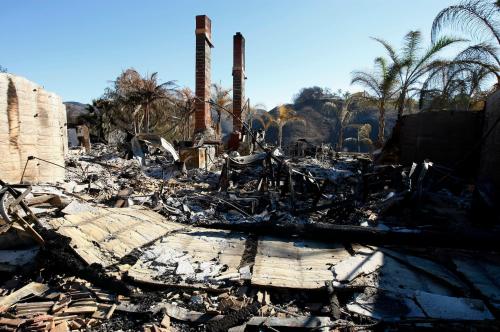

12:30 pm EDT - 1:00 pm EDT
Past Event
12:30 pm - 1:00 pm EDT
1775 Massachusetts Ave., NW
Washington, DC
As the nation’s economy continues a slow and difficult recovery, climate change has so far received little attention on the presidential campaign trail. With the world’s carbon footprint soaring and America approaching an energy crossroads, however, the next president will be forced to make critical decisions regarding clean energy and the future of fossil fuels in the United States.
How do the climate policies of President Obama and candidate Romney differ? Does political will exist to implement a U.S. carbon tax? On June 13, Brookings expert Katherine Sierra took your questions and comments in a live web chat moderated by Vivyan Tran of POLITICO.
12:29 Vivyan Tran: Welcome everyone, let’s get started!
12:30 Comment From Anne: How does the United States regain its status as a leader on climate change?
12:32 Katherine Sierra: The United States can regain its leadership role in climate change if it is ready to take decisive action in setting a price on carbon — while a cap-and-trade system is off the table politically, a carbon tax, linked to deficit reduction, could hold the key. But unfortunately, this is unlikely in the near term. So, it will be up to states, cities and coalitions of actors (business, civil society and local governments) for the time being. At least we can make movement on showing that through innovation, a new pathway is feasible.
12:32 Comment From Elizabeth, R: Why do you think the American public lacks a real urgency on climate change? Are individuals just preoccupied with other issues like the economy, health care etc?
12:36 Katherine Sierra: The impacts of climate change are long term, but the costs (at least the transition costs) are short term. Our political leaders have not been able to provide a narrative that builds on the science and navigates the trade-offs and opportunities in a compelling way. Indeed, the opposite has happened, climate change has been a polarizing issue. Will the impacts of climate — more and more costly disasters — change the dynamic? Will this happen in time to actually allow emission reductions to reverse course?
12:36 Comment From Erica: Will the 2012 presidential election prove a milestone in U.S. climate policy? Do Romney and Obama represent two fundamentally different views on the environment and clean tech?
12:40 Katherine Sierra: While the election will be important, and the two candidates have different approaches and views, climate action in the United States will be constrained in the near term whatever the outcome. A second Obama term will face the same political constraints with a divided electorate. Fiscal constraints and jobs will also reduce the President’s ability to take bold action. A Romney presidency will likely move to weaken United States leadership in international negotiations. However, beyond the rhetoric, he may buy into a strategy that focuses on private-sector led innovation, albeit not billed as a climate policy.
12:40 Comment From Erica, D: Given renewed fears about a global recession, can investments in clean tech or green energy support growth in both developed and developing nations?
12:45 Katherine Sierra: Many countries and sub-national governments are thinking through strategies that support a fundamentally different clean- or green-economy paradigm. An example is Korea which used its stimulus policies to drive clean energy investments, and is now focusing on a broader low-carbon, green economy as a way to drive growth and jobs. City leaders are also focusing on how they can harness innovation to improve their competitiveness, locally and globally. For developing countries, international support to help them build innovation systems and to leverage private capital to drive growth should be a priority. In the United States, placing a price on carbon, recycling some of the funds to support research and development, could be an important move.
12:45 Comment From Carmen: Has the Obama administration really progressed on international climate that much more than where we were at the end of the Bush administration?
12:49 Katherine Sierra: The Obama administration has been successful in changing the terms of the international debate in the climate negotiations. Coming from the near debacle at the Copenhagen climate talks through Cancun and Durban, there is now recognition that all parties — not just historical emitters like the US, but also new, large emitters, like China — will need to take action if the global problem is to be solved. So, the new approaches, which rely on pledge-and-review mechanisms, are a first start. So is the new language agreed to in Durban that calls for a new agreement with legal force covering all actors. While the large emerging economies still push back on this formulation, the stage has been set. However, returning to the first question in this chat, what is still needed is action on the part of the United States, along with China, to break the log jam.
12:49 Comment From Amos: Do you think that a carbon tax could alleviate some of the economic stress on the US? How so?
12:53 Katherine Sierra: My Brookings colleague Ted Gayer has produced an excellent paper outlining the ways in which a carbon tax could both contribute to deficit reduction and climate and pollution control. He posits a three-pronged strategy: Price environmental externalities (e.g., GHG emissions) through a carbon tax; use the revenue to reduce the deficit; and eliminate redundant and costly environmental regulations that were put in as “second-best” solutions to the emissions problem. Pricing carbon will also send the appropriate signal to innovators and investors, which should help spur technological advances.
12:53 Comment From Chris: Aren’t the short-term costs of climate change just as real and important? Sometimes it can be difficult to see the importance of climate change legislation when so many people’s livelihoods depend on the energy industry — including fossil fuels. Are efforts to reduce climate change worth sacrificing people’s jobs? Their financial security and well-being?
12:57 Katherine Sierra: Agree that the short-term costs are real and important. This is so not just here in the United States, but also in developing countries where leaders are concerned first and foremost about meeting the poverty alleviation and growth objectives of their people. But, we also know that many of the elements of a climate strategy (improvements in energy efficiency, new forms of transportation) are cost effective and will bring benefits now that outweigh the costs…so these should be implemented now.
To build a climate consensus in this country, there will need to be strategies that recognize the transition costs to those industries and people that will be impacted in the short run.
12:57 Comment From Sarah: Could innovations in climate change policy come from the states, rather than federal mandates from above?
1:00 Katherine Sierra: Innovations are coming from the states, and from the cities. But, as mayors from the U.S. and abroad who met in Chicago in May stated: The greener the national policy framework, the easier it will be for cities to meet their own challenges.
Over the next few years I expect that we will see important, real-time innovations coming from the bottom up….but ultimately, there will need to be a national (and international) policy framework if these are to be scaled up to the level needed to confront the climate challenge.
1:00 Vivyan Tran: Thanks for the questions everyone. See you next week!
12:30 pm - 1:00 pm
As the nation’s economy continues a slow and difficult recovery, climate change has so far received little attention on the presidential campaign trail. On June 13 , Brookings expert Katherine Sierra took your questions and comments in a live web chat moderated by Vivyan Tran of POLITICO.

Elaine Kamarck
July 2, 2025

Barry G. Rabe
April 21, 2025

Vanessa Williamson, Ellis Chen
January 31, 2025